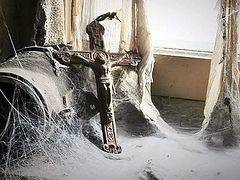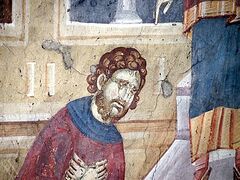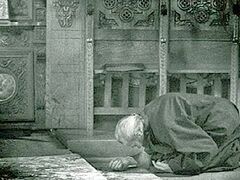An hourglass measures the passing of time. Different amounts of the sand called life have been measured for all of us. Our life pours through the neck of the hourglass every day. And the sand of today is falling there—into eternity.
Of course, maybe God will give us more time to live! Everyone wants to live longer and to have more sand. We do not know what God will do next, but we do know for sure how much time has already passed, how much sand has poured out into eternity. Every grain of sand is like a day. Therefore, the Church says at the Divine Liturgy: “That the whole day may be perfect, holy, peaceful, and sinless, let us ask the Lord...” We ask for a holy, sinless, and pure day. We draw our day like artists. But sometimes the picture appears dull: We don’t manage to live through a day without sinning. Of course, we want to live without sin. But these grains of sand are often painted gray, and this is at best. And if, God forbid, they are painted black! Then it’s a bad thing.
The sand of the day does not just fall anywhere. It falls right into our hearts! We bear everything in our hearts! All our evil deeds, everything is imprinted there; all the scars from our wounds are there.
As we know, we can commit a sin in our youth and still feel ashamed in old age, as if we committed it yesterday. Sin has no time limit. The criminal code provides a statute of limitations for each crime, after which a person will no longer be prosecuted. The water has flowed under the bridge, and, according to the law, the person has reformed; so many years have passed and that’s it, there is no need to punish him for that crime. Life itself has most likely already punished him. But sin is cunning: It lies in hiding, lurking somewhere in us, in the depths of our souls, and then at the right moment it can sting us again. And what do the Holy Fathers advise us to do? Every sin that arises in us is like a snake, like a viper that comes out of a hole must be beaten on the head so that it may stay there in the hole without coming out until it dies. It is necessary to beat it all the time!
If blasphemous thoughts come, for example, when you are standing and praying at church; some nonsense comes into your mind and there is some blasphemy in it both against God and against people—something you could have never imagined—it is from the evil one. The saints advise us to “say” inwardly: “You, evil one, will burn in hell for these thoughts! These thoughts are not mine, but yours. I’m going to God!”
The Lord has given us a great opportunity: to whiten, to purify every day and our whole lives. Our life is such that we need to cry out all the time with the psalmist: Thou shalt sprinkle me with hysso, and I shall be made clean, Thous shalt wash me and I shall be whiter than snow. Thou shalt make me to hear joy and gladness; the bones that be humbled will rejoice (Ps. 50:9, 10).
We ask the Lord: “Purge me, cleanse me!” And then our ears will rejoice when we hear: “You are forgiven!” When the priest covers us with the epitrachelion and says, “I forgive and absolve you from all your sins”, our bones and ears rejoice. Our hearts jubilate!
We have a great joy: We can repent, we can receive forgiveness with our contrite hearts before the Face of God, and our bones themselves can feel joy. “You are forgiven, you have been blessed!” Your days that have passed, your life that is nearing its end, your minutes and deeds are being whitened by God with the Lord’s Blood—at a high price.
Sometimes people say, “I would give everything if only this would not have happened!” repenting and striving to whiten their past sins. And God did just that! He gave the most precious thing so that all our sins would not exist: For God so loved the world, that He gave His only begotten Son, that whosoever believeth in Him should not perish, but have everlasting life (Jn. 3:16). To make our bones rejoice, Christ was hanged on a tree. So that our ears would be filled with joy and jubilation by forgiveness granted, Christ shed His Blood. His hands were tied with straps and nailed so that we would no longer be bound by sin, so that we would no longer be captive to it and led by it, as an ox goeth to the slaughter (Prov. 7:22), as the wise Solomon said. His hands were nailed so that our hands would no longer be nailed to sin, but to the truth, good works, sincerity, love, and mercy.
There is an Akathist to the Passion of Christ, which is read during Lent. And it has approximately the following lines: “They put on Thee a crown of thorns so that my head would be cleansed from all evil, from evil thoughts; they pierced Thy hands so that my hands would do good and renounce evil; they nailed Thy feet, O Lord, so that I would walk the path of righteousness; they pierced Thy rib, O Lord, and blood and water flowed out of Thy heart so that my heart would be devoted to Thee.”
What a mercy of God on us! What a mercy of God is extended to us! In order for every day of ours to be blessed by God and our every minute to be blessed by God, the Lord gave His Son. He gave Him so that He would live this life and whiten our lives; so that He would walk this path, and our path would be made straight by Him for the good.
The Lord took all our sins to cleanse us so that what David asked for would happen: Sprinkle me with hysso, and I shall be clean: wash m, and I shall be made whiter than snow. Cleansing, whitening... The bones which that be humbled will rejoice...; Make me to hear joy and gladness—so that the bones would rejoice. The bones that get old, and sometimes joints hurt, and sometimes there is no strength to rise—but they still rejoice in the Lord! Because they will eventually receive eternal youth and forgiveness when the Lord raises us all from the dead, grants us the enjoyment of eternal life and reign with Him in His Glory, where His might, His power and His strength lie.
And thus, brothers and sisters, entering this new day, this week, we will take a brush and paint the day in bright colors and adorn it.
What color will we paint it? Will it be the color of prayer so that the day should begin with prayer and go on with the thread a prayer, with prayer passing through the whole day? Or will there be laziness, apathy, depression and despondency? Or bad and impious words and thoughts?
Or we will take up the color of humility and patience before the Lord and paint with it: “O Lord, I endure in Thy holy Name! In Thy holy joy, O Lord, do I want to walk! I don’t want to despair—I put My trust in Thee.”
Let’s take the color of trust and hope in God, and let this color be bright!
Let our day, our grains of sand—twenty-four hours a day— all be painted in virtue, in the joy of God, in patience, in love, in mercy, in meekness. Let’s not refuse to do good deeds and hasten to do good. Let virtue restrain our tongues from judging and from untruth.
When asked: “How should I live?”, St. Ambrose of Optina used to say: “Don’t grieve!” That is, what color should I take? Joy! “Don’t condemn anyone. Don’t annoy anyone.” We know how sometimes we can say, “You’ll get exactly the same you’ve done to me!” Tit for a tat. We can do something like this, we can bite or sting in response. But we must avoid judging. That is the gate to sorrow. St. Ambrose would conclude, “And respect everyone!” It is necessary to be at peace with everyone. The Apostle Paul exhorted us, If it be possible, as much as lieth in you, live peaceably with all men (Rom. 12:18), and you will feel good. And why do we need enemies? You are compelled to fight with your enemies! And if you start fighting—where is peace? Where is happiness?
O Lord, give us this opportunity: to not grieve, to not condemn anyone, to not annoy anyone, and to respect everyone! To paint our every day in the colors of Christian virtues—beautiful and bright. May all our days be cheerful, joyful, spiritual, godly, and filled with every virtue and truth.
May the Lord strengthen and bless you, instructing you in every good deed, in every truth, love and mercy!




